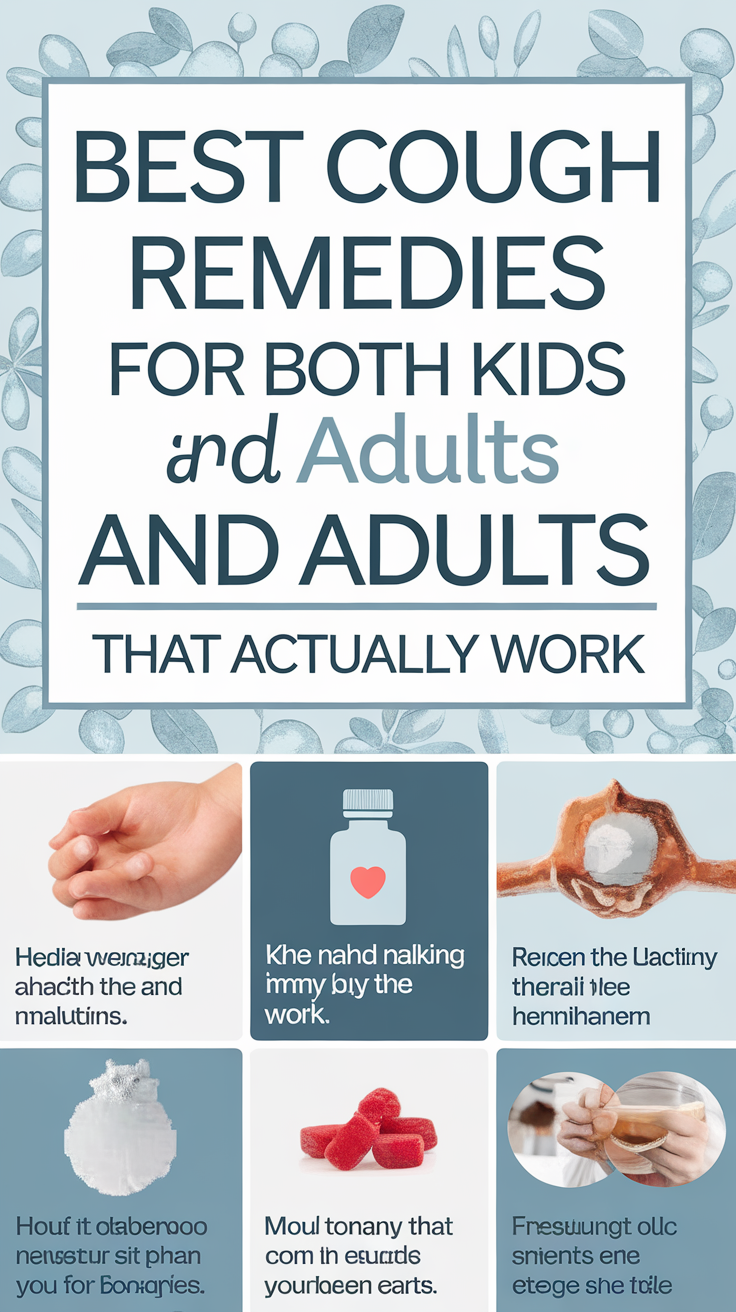Best Natural Cough Remedies for Kids and Adults
You can effectively treat coughs using safe, natural remedies like honey mixed with warm water for children over one year old, or soothing herbal teas such as chamomile and thyme for older kids and adults. Steam inhalation with eucalyptus oil helps loosen congestion, while essential oils in diluted form can provide relief when used correctly. Always monitor symptoms and consult your pediatrician before trying new treatments, especially for young children. Our comprehensive guide offers more natural solutions to ease those troublesome coughs.
Understanding Different Types of Coughs
Everyone experiences different types of coughs, and knowing which kind you have is the first step in finding relief.
You’ll typically encounter dry coughs, which don’t produce mucus, or wet coughs that bring up phlegm. While dry coughs often result from allergies or throat irritation, wet coughs usually signal respiratory infections.
When seeking natural cough remedies, it’s important to match the treatment to your specific cough type.
For children especially, identifying whether the cough is dry or wet helps determine the most effective approach. In addition, understanding the various cough types can help parents navigate the appropriate remedies for their kids more effectively.
Remember that persistent coughs lasting more than two weeks need medical evaluation.
Honey-Based Natural Remedies
Honey stands as one of nature’s most effective cough suppressants, backed by both traditional wisdom and modern research.
For children over one year old, you’ll find several safe and soothing honey-based remedies to help ease their cough symptoms.
-
Mix 1-2 teaspoons of raw honey with warm water and a splash of lemon juice.
-
Create a calming bedtime blend of honey with chamomile tea.
-
Combine honey with warm milk and a pinch of turmeric.
-
Use honey with ginger tea, ideal for wet coughs.
Additionally, honey’s natural antimicrobial compounds soothe irritated throat tissues, enhancing its effectiveness in relieving cough symptoms.
Remember: Never give honey to infants under 12 months due to botulism risk.
Herbal Teas and Their Therapeutic Properties
When managing your child’s cough symptoms, herbal teas offer gentle yet effective relief through their natural therapeutic compounds.
You’ll find chamomile particularly soothing for nighttime coughs, while thyme tea helps loosen chest congestion.
Marshmallow root tea creates a protective coating that calms irritated throats.
For children over 12 months, add a teaspoon of honey to enhance the tea’s effectiveness. Always serve herbal teas lukewarm, never hot, and start with small amounts to check for any sensitivities.
Research supports the use of root-based remedies such as marshmallow root for their anti-inflammatory benefits.
Remember to consult your pediatrician before introducing new herbal remedies, especially for children under five years old.
Essential Oils for Cough Relief
Several essential oils provide natural relief for your child’s cough symptoms, though they must be used with careful attention to safety guidelines.
Always dilute oils properly and consult your pediatrician before use.
-
Eucalyptus: Mix 2-3 drops with a carrier oil for chest rubs, or add to a diffuser to help clear congestion.
-
Lavender: Safe for most children when diluted; aids sleep and reduces nighttime coughing.
-
Peppermint: Use in steam inhalation for children over 6 years to ease breathing.
-
Tea Tree: Add to bathwater or diffuser to fight respiratory infections.
In addition to using essential oils, consider incorporating natural remedies for a more holistic approach to relieving cough symptoms.
Never apply oils directly to children’s skin or let them ingest them.
Kitchen Ingredients That Fight Coughs
Your kitchen cabinets likely contain natural ingredients that can provide safe, effective relief for your child’s cough symptoms.
Try mixing honey with warm water or adding it to herbal tea for children over age one. A pinch of ginger or turmeric mixed into warm milk can help soothe irritated throats. In addition, the soothing qualities of honey’s antimicrobial properties help alleviate cough symptoms effectively.
For persistent coughs, create a saltwater gargle solution using 1/4 teaspoon of salt in warm water. If your child’s old enough to gargle, this can reduce throat inflammation.
You’ll also find relief with fresh lemon juice mixed with honey, which helps thin mucus and boost immunity.
Age-Appropriate Natural Remedies for Children
Natural remedies must be carefully selected based on your child’s age and developmental stage.
Always consult your pediatrician before trying any home treatments, as what’s safe for adults may not be suitable for children.
For safe, age-appropriate cough relief:
- Under age 1: Use steam showers, saline drops, and gentle back pats
- Ages 1-4: Add warm honey water (no honey before age 1), elevated sleeping position
- Ages 4-7: Try diluted chamomile tea, warm lemon water with honey
- Ages 8+: Incorporate mild ginger tea, thyme-honey mixtures, and saltwater gargles
Additionally, understanding the benefits of natural remedies for toddlers can guide parents in selecting the most appropriate treatments.
When to Use Natural vs. Medical Treatment
When deciding between natural remedies and medical treatments for your child’s cough, it’s crucial to recognize the severity of symptoms and understand key warning signs.
Choose natural remedies for mild coughs without fever, when your child is active and eating normally.
However, seek medical treatment if you notice difficulty breathing, persistent high fever, coughing up blood, or symptoms lasting more than 10 days.
Don’t delay medical care for infants under 3 months with any cough.
Always trust your parental instinct – if you’re concerned about your child’s cough, consult your pediatrician rather than solely relying on natural treatments.
Prevention Tips and Lifestyle Adjustments
While treating coughs is important, preventing them through proper lifestyle habits can significantly reduce their occurrence in children.
You’ll want to establish these essential practices in your household to protect your little ones from developing persistent coughs.
-
Keep your child’s room humidified and dust-free, maintaining optimal air quality between 30-50% humidity.
-
Ensure they drink plenty of water throughout the day to maintain hydrated airways.
-
Practice proper hand hygiene with regular washing using soap and warm water.
-
Strengthen their immune system with adequate sleep, healthy nutrition, and daily exercise.
Safe Dosage and Application Methods
Before administering any natural cough remedy to your child, understanding proper dosage and application methods is crucial for both safety and effectiveness.
For honey, give children over age one 2-5 ml (½-1 teaspoon) as needed. Never give honey to infants under 12 months.
When using essential oils, dilute 1-2 drops in 2 tablespoons of carrier oil for children over age 2. Apply to chest or diffuse in room.
For salt water gargles, mix ¼ teaspoon salt in 8 ounces warm water. Ensure your child can gargle without swallowing, typically age 6 and older.
Research-Backed Natural Remedies
Scientific studies have validated several natural remedies as effective treatments for childhood coughs.
Research shows these options can provide relief while supporting your child’s immune system:
-
Honey (for children over 12 months): Studies confirm 2-5 ml before bedtime reduces nighttime coughing and improves sleep quality.
-
Thyme tea: Clinical trials demonstrate its effectiveness in reducing cough frequency and intensity.
-
Steam inhalation with eucalyptus: Research supports its ability to loosen mucus and ease breathing.
-
Ginger-lemon tea: Studies show anti-inflammatory properties that help soothe irritated airways.
Always consult your pediatrician before trying new remedies, especially for children under two years old.







